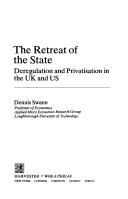| Listing 1 - 10 of 1030 | << page >> |
Sort by
|
Book
ISBN: 3428066006 3428466004 Year: 1989 Publisher: Berlin Duncker & Humblot
Abstract | Keywords | Export | Availability | Bookmark
 Loading...
Loading...Choose an application
- Reference Manager
- EndNote
- RefWorks (Direct export to RefWorks)
Book
ISBN: 900463908X Year: 1998 Publisher: The Hague, The Netherlands : Kluwer Law International,
Abstract | Keywords | Export | Availability | Bookmark
 Loading...
Loading...Choose an application
- Reference Manager
- EndNote
- RefWorks (Direct export to RefWorks)
Book
ISBN: 9780199795680 0199795681 Year: 2011 Publisher: New York ; Oxford : Oxford University Press,
Abstract | Keywords | Export | Availability | Bookmark
 Loading...
Loading...Choose an application
- Reference Manager
- EndNote
- RefWorks (Direct export to RefWorks)
Book
ISBN: 9780195374964 Year: 2009 Publisher: Oxford Oxford university press
Abstract | Keywords | Export | Availability | Bookmark
 Loading...
Loading...Choose an application
- Reference Manager
- EndNote
- RefWorks (Direct export to RefWorks)

ISBN: 0745001521 Year: 1988 Publisher: Hemel Hempstead Harvester Wheatsheaf
Abstract | Keywords | Export | Availability | Bookmark
 Loading...
Loading...Choose an application
- Reference Manager
- EndNote
- RefWorks (Direct export to RefWorks)
Book
ISBN: 3428087690 Year: 1997 Publisher: Berlin Duncker und Humblot
Abstract | Keywords | Export | Availability | Bookmark
 Loading...
Loading...Choose an application
- Reference Manager
- EndNote
- RefWorks (Direct export to RefWorks)
Book
Year: 2016 Publisher: Washington, D.C. : The World Bank,
Abstract | Keywords | Export | Availability | Bookmark
 Loading...
Loading...Choose an application
- Reference Manager
- EndNote
- RefWorks (Direct export to RefWorks)
This paper analyzes analyze the impact of deregulatory reforms in India during the 1990s, which eliminated compulsory industrial licensing, on manufacturing firms' investment decisions. The paper finds an economically and statistically significant positive effect of delicensing on investment. It also shows that firms in states with better credit conditions benefitted more from the removal of licenses. Moreover, the analysis demonstrates that the increase in investment was predominantly driven by smaller firms.
Book
Year: 2006 Publisher: [Washington, D.C.] : U.S. Government Accountability Office,
Abstract | Keywords | Export | Availability | Bookmark
 Loading...
Loading...Choose an application
- Reference Manager
- EndNote
- RefWorks (Direct export to RefWorks)
Airlines --- Deregulation
Book
ISBN: 3161562089 3161566467 9783161562082 Year: 2018 Publisher: Tübingen : Mohr Siebeck,
Abstract | Keywords | Export | Availability | Bookmark
 Loading...
Loading...Choose an application
- Reference Manager
- EndNote
- RefWorks (Direct export to RefWorks)
Im Herbst 2017 ist Jürgen Basedow als Direktor am Hamburger Max-Planck-Institut für ausländisches und internationales Privatrecht in den Ruhestand getreten. Dies war Anlass für das Institut und seine Schülerinnen und Schüler, unter dem Motto "Mehr Freiheit wagen" einen Leitgedanken seines Schaffens ( Basedow: Mehr Freiheit wagen - Über Deregulierung und Wettbewerb, Tübingen 2002) im Rahmen eines Symposiums aufzugreifen und für seine breit gefächerten Forschungsgebiete neu zu hinterfragen. Der Band umfasst neben einem Einführungsreferat und den Geleit- und Schlussworten Beiträge aus der "Basedow-Schule" zum Bürgerlichen Recht und Versicherungsrecht, zum Arbeits- und Wirtschaftsrecht, zum Kollisions- und Verfahrensrecht sowie zu den Grundlagen des Rechts und zur Rechtsvergleichung.
Book
ISBN: 147240128X 1317105427 1409450910 1315592304 1317105435 Year: 2016 Publisher: London ; New York : Routledge,
Abstract | Keywords | Export | Availability | Bookmark
 Loading...
Loading...Choose an application
- Reference Manager
- EndNote
- RefWorks (Direct export to RefWorks)
The last few decades have witnessed substantial liberalization trends in various industries and countries. Starting with the deregulation of the US airline industry in 1978, regulatory restructuring took place in further network industries such as telecommunications, electricity or railways in various countries around the world. Although most of the liberalization movements were initially triggered by the worrying performances of the respective regulatory frameworks, increases in competition and corresponding improvements in allocative and productive efficiency were typically associated with the respective liberalization efforts. From an academic perspective, the transition from regulated industries to liberalized industries has attracted a substantial amount of research reflected in many books and research articles which can be distilled to three main questions: (1) What are the forces that have given rise to regulatory reform? (2) What is the structure of the regulatory change which has occurred to date and is likely to occur in the immediate future? (3) What have been the effects on industry efficiency, prices and profits of the reforms which have occurred to date? Liberalization in Aviation brings together renowned academics and practitioners from around the world to address all three questions and draw policy conclusions. The book is divided into five sections, in turn dealing with aspects of competition in various liberalized markets, the emergence and growth of low-cost carriers, horizontal mergers and alliances, infrastructures, and concluding with economic assessments of liberalization steps so far and proposed steps in the future.
| Listing 1 - 10 of 1030 | << page >> |
Sort by
|

 Search
Search Feedback
Feedback About UniCat
About UniCat  Help
Help News
News